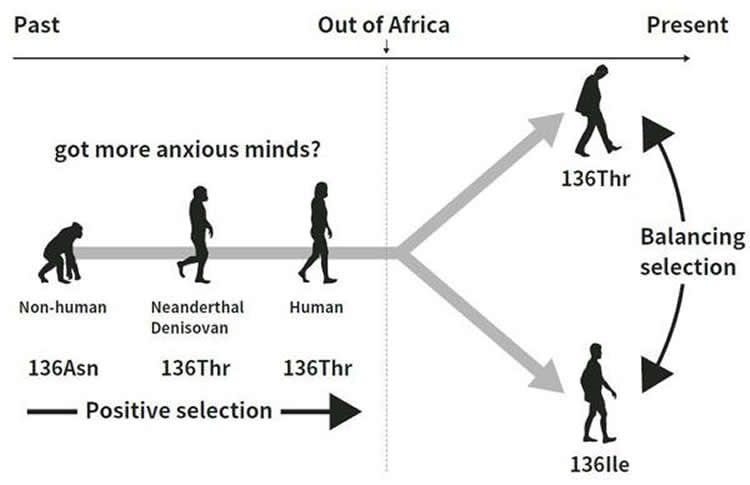Summary: Researchers have identified a gene that has evolved through natural selection and is implicated in psychiatric disorders and personality traits. The study suggests natural selection has helped shaped our psychiatric traits and helped to maintain human diversity.
Source: Tohoku University.
How and why human-unique characteristics such as highly social behavior, languages and complex culture have evolved is a long-standing question. A research team led by Tohoku University in Japan has revealed the evolution of a gene related to such human-unique psychiatric traits.
PhD candidate Daiki Sato and Professor Masakado Kawata have discovered SLC18A1 (VMAT1), which encodes vesicular monoamine transporter 1, as one of the genes evolved through natural selection in the human lineage. VMAT1 is mainly involved in the transport of neurochemicals, such as serotonin and dopamine in the body, and its malfunction leads to various psychiatric disorders. VMAT1 has variants consisting of two different amino acids, threonine (136Thr) and isoleucine (136Ile), at site 136.
Several studies have shown that these variants are associated with psychiatric disorders, including schizophrenia, bipolar disorder, anxiety, and neuroticism (a personality trait). It has been known that individuals with 136Thr tend to be more anxious and more depressed and have higher neuroticism scores. They showed that other mammals have 136Asn at this site but 136Thr had been favored over 136Asn during human evolution. Moreover, the 136Ile variant had originated nearly at the Out-of-Africa migration, and then, both 136Thr and 136Ile variants have been positively maintained by natural selection in non-African populations.

The study by Sato and Kawata indicates that natural selection has possibly shaped our psychiatric traits and maintained its diversity. The results provide two important implications for human psychiatric evolution. First, through positive selection, the evolution from Asn to Thr at site 136 on SLC18A1 was favored by natural selection during the evolution from ancestral primates to humans, although individuals with 136Thr are more anxious and have more depressed minds.
Second, they showed that the two variants of 136Thr and 136Ile have been maintained by natural selection using several population genetic methods. Any form of natural selection that maintains genetic diversity within populations is called “balancing selection”. Individual differences in psychiatric traits can be observed in any human population, and some personality traits are also found in non-human primates. This suggests the possibility that a part of genetic diversity associated with personality traits and/or psychiatric disorders are maintained by balancing selection, although such selective pressure is often weak and difficult to detect.
Funding: Japan Society for the Promotion of Science funded this study.
Source: Masakado Kawata – Tohoku University
Publisher: Organized by NeuroscienceNews.com.
Image Source: NeuroscienceNews.com image is credited to Daiki Sato.
Original Research: Open access research for “Positive and balancing selection on SLC18A1 gene associated with psychiatric disorders and human‐unique personality traits” by Daiki X. Sato and Masakado Kawata in Evolution Letters. Published August 21 2018.
doi:10.1002/evl3.81
[cbtabs][cbtab title=”MLA”]Tohoku University”The Evolution of Psychiatric Disorders and Personality Traits.” NeuroscienceNews. NeuroscienceNews, 7 September 2018.
<https://neurosciencenews.com/personality-psychiatry-genetics-9820/>.[/cbtab][cbtab title=”APA”]Tohoku University(2018, September 7). The Evolution of Psychiatric Disorders and Personality Traits. NeuroscienceNews. Retrieved September 7, 2018 from https://neurosciencenews.com/personality-psychiatry-genetics-9820/[/cbtab][cbtab title=”Chicago”]Tohoku University”The Evolution of Psychiatric Disorders and Personality Traits.” https://neurosciencenews.com/personality-psychiatry-genetics-9820/ (accessed September 7, 2018).[/cbtab][/cbtabs]
Abstract
Positive and balancing selection on SLC18A1 gene associated with psychiatric disorders and human‐unique personality traits
Maintenance of genetic variants susceptible to psychiatric disorders is one of the intriguing evolutionary enigmas. The present study detects three psychiatric disorder‐relevant genes (CLSTN2, FAT1, and SLC18A1) that have been under positive selection during the human evolution. In particular, SLC18A1 (vesicular monoamine transporter 1; VMAT1) gene has a human‐unique variant (rs1390938, Thr136Ile), which is associated with bipolar disorders and/or the anxiety‐related personality traits. 136Ile shows relatively high (20–61%) frequency in non‐African populations, and Tajima’s D reports a significant peak around the Thr136Ile site, suggesting that this polymorphism has been positively maintained by balancing selection in non‐African populations. Moreover, Coalescent simulations predict that 136Ile originated around 100,000 years ago, the time being generally associated with the Out‐of‐Africa migration of modern humans. Our study sheds new light on a gene in monoamine pathway as a strong candidate contributing to human‐unique psychological traits.







